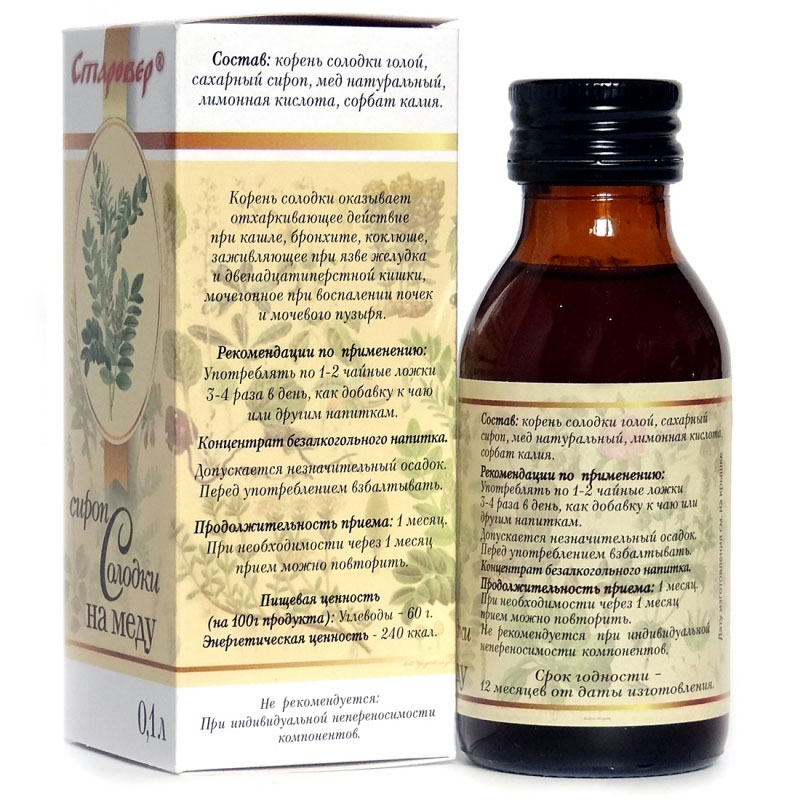
Instructions for the use of licorice root syrup.
The content of the article
- What helps the syrup of licorice root, and what is his composition?
- Syrup of licorice root - from what age you can give to children, with what cough take: during dry or wet?
- Licode root syrup: abstract, instructions for use and dosage for children up to a year and older than a year
- Licorice root syrup: abstract, instructions for use and dosage for adults
- Is it possible and how to taking licorice root syrup during pregnancy and breastfeeding?
- How to taking licorice root syrup from cough adults and children: before eating or after meals?
- Licode rooting syrup: How many days do you need to take adults and children?
- Licode root syrup: Contraindications, side effects
- Licode rooting syrup: doctors' reviews
- Video: licorice. Drug sweetness
With the onset of cold and wet autumn, the number of pathogenic viruses and bacteria in the air begins to be excavated.
For this reason, it was during the cold time of the year that people suffer more often than usual and as practice shows, respiratory diseases are affected. Of course, such pathologies are always accompanied by a strong cough, which does not give a silence in the afternoon.
Get rid of such a problem can help inexpensive, but very effective syrup made from licorice root. What diseases he treats and how to take it right and talk to our article.
What helps the syrup of licorice root, and what is its composition?

Therapeutic properties of the drug
Syrup root licorice - This is a dosage of a flour, which is made of the so-called laccic root. This medicine effectively blocks inflammation in the respiratory tract and enhances the processes that are responsible for the wet wet and its output. As a rule, high-quality syrup is made from licorice root extract, sugar syrup, distilled water and ethyl alcohol.
In case you will see more components on the label, then with great confidence you can say that you are trying to sell a completely different medicine. If you open a bottle with original syrup, you will see a viscous liquid of brown color with a rather specific smell.
Medicinal medication:
- Exclamation
- SPASMOLITIC
- Corticosteroid
- Regenerating
- Immunomodulatory
Indications for the application of licorice root:
- Tracheitis
- Pharyngitis
- Laryngitis
- Bronchitis
- Pneumonia
- Asthma
- Allergic cough
Syrup of licorice root - from what age you can give to children, with what cough take: during dry or wet?
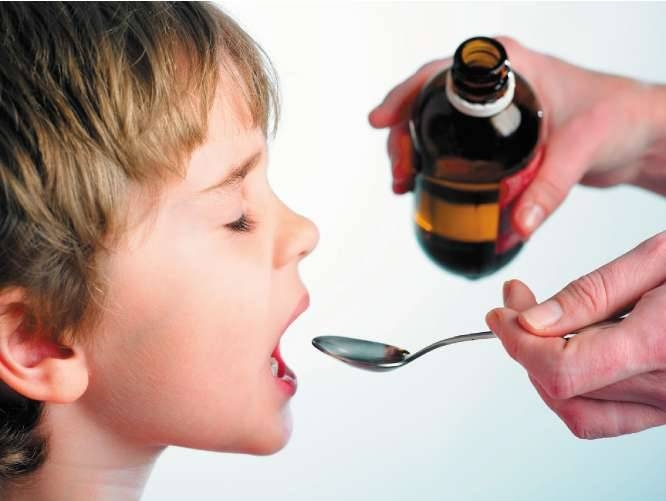
Syrup The licorice root can be used with all types of cough
As for what cough can be treated with licorice syrup, then the specialists are most often prescribed at dry. It is believed that with regular reception, this agent diligently diluted with a sputum, so that it quickly goes out and this does not lead to the exacerbation of pathology.
But all this does not mean that licorice syrup cannot be used to treat wet cough. With wet cough, this tool copes no worse than with dry. In this case, it has antibacterial and anti-inflammatory effect. Due to the fact that this antitussive agent is softly affecting the body, it can be given to small children without fears.
Although the Instructions indicate that it can be given to the kids, starting in the year, some experts allow parents to treat them a child even earlier. True, if such a medicine is given to children until the year, it is bred by water and the smallest dose is reduced by half.
Licode root syrup: abstract, instructions for use and dosage for children up to a year and older than a year
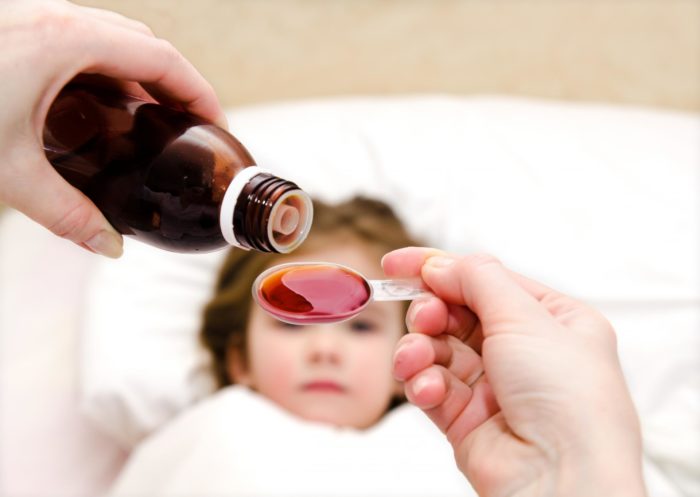
Recommendations for receiving medicine for children
As you already, probably, understood from the above written, licorice root syrup can be safely used to treat children.
Depending on the severity of the course of the disease, it will need to take 2-4 times a day, drinking with a small amount of clean water. As practice shows, a 10-day drug intake is enough for broncht and lungs completely cleaned of sputum.
Recommendations for receiving medicine:
- Children from 1 year to 3 years to 1.5-2.5 ml 3 times day
- Children from 3 to 6 years to 5-7.5 ml 3 times a day
- Children from 6 to 9 years to 7.5-10 ml 3 times a day
- Children from 9 to 12 years 12 ml 3 times a day
Licorice root syrup: abstract, instructions for use and dosage for adults

Recommendations for adult medication
Although licorice root syrup belongs to non-prescription drugs, it is impossible to accept it. Since it is still a medicine, the overdose can provoke the emergence of new problems, for example, with a gastrointestinal tract. In view of this, even adult people should be taken, not exceeding the dose.
So:
- With inflammation of the upper respiratory tract 15 ml 2 times a day
- With inflammation of the lower respiratory tract 15 ml 3 times a day
Is it possible and how to taking licorice root syrup during pregnancy and breastfeeding?

Recommendations for receiving medicine during pregnancy
At first glance, it may seem that licorice root syrup is a harmless medicine that cannot harm. Yes, it has a lot of advantages, but unfortunately, it contains substances that can harm the child.
With uncontrolled admission, they can increase the hormonal background and violate metabolic processes, and this is fraught with the interruption of pregnancy, especially in the early stages. For this reason, most gynecologists advise women to refrain from using this tool in 1 trimester of pregnancy.
And since 2 trimesters, the syrup can be taken safely, just need to not exceed the permissible dose. As for the use of the medication during lactation, it is possible to do this without fear for their health and a small person.
How to taking licorice root syrup from cough adults and children: before eating or after meals?
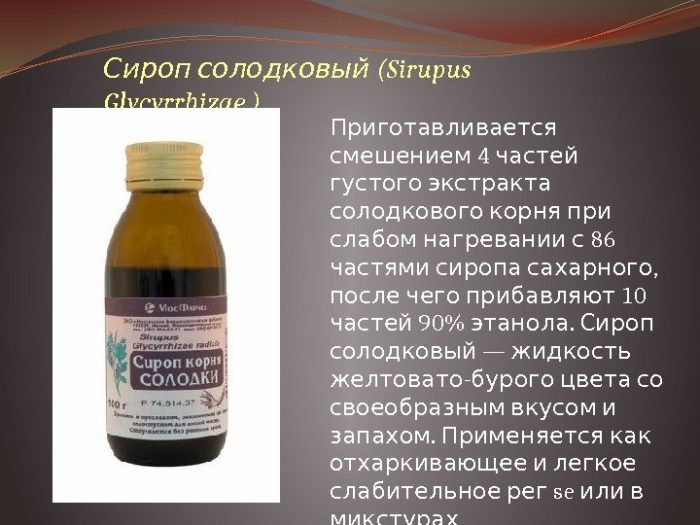
Recommendations for the reception of licorice root syrup
There is a category of people who do not bother when you need to drink medicine, before or after eating. As a rule, such women and men eventually make out new problems as this seemingly unimportant to the nuance at first glance, it is very important for effective treatment. In view of this, if you want a licorice root syrup to affect the body correctly, then use it after eating, be sure to drink water.
Licode rooting syrup: How many days do you need to take adults and children?
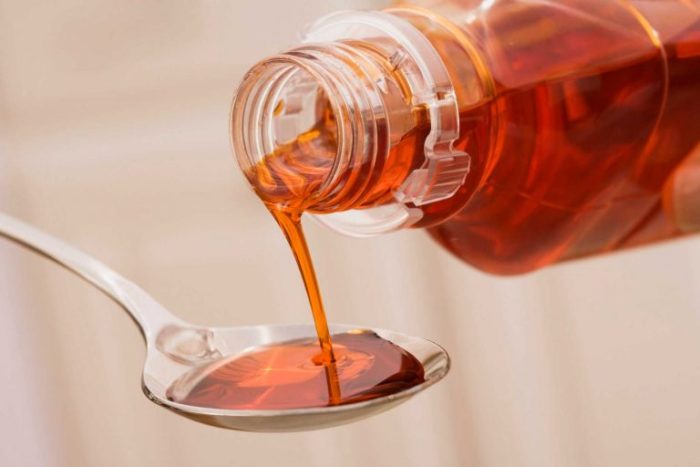
Recommendations for receiving medicine
As a rule, with a normal course of the disease, the syrup of the licorice root copes with the tasks for 7-10 days. If the patient strictly follows all the instructions of the doctor, then this time is enough to block inflammation in the trachea, bronchops and lungs, and bring all the sputum outward.
In case the disease occurs hard, the drug is allowed to 14 days. If after this time the improvement does not occur, it means that either the drug does not fit, or it must be applied together with the antibiotics of a wide range of action. A, in general, some specialists allow licorice for 21 days, provided that all this time the disease will go to the decline.
Licode root syrup: Contraindications, side effects

Licode root syrup: Contraindications, side effects
Licode root syrup, like any medicinal product, is able to provoke side effects. As a rule, such problems appear in the event of an overdose and they are manifested by headache, nausea and dizziness.
In addition, this medicine is better not to be treated to people who have the intolerance to the syrup components. In this case, tear, runny nose and skin rash must be connected to the already mentioned symptoms.
Contraindications for use:
- 1 trimester of pregnancy
- Chronic pathology of the digestive system
- Renal and liver failure
- Template to swells
- Template to allergies
- Diabetes
- Obesity of the last stage
Licode rooting syrup: doctors' reviews

Licode rooting syrup: doctors' reviews
Julia (pediatrician): Very often I appoint this drug to my little patients. If the parents carefully listen to my instructions, then after a week, the kid returns to his usual pastime.
The only thing you want to remind parents, do not forget that the disease is very strongly depleted by the children's body. And in order for him during treatment, he had forces on the struggle, he needed a maximum of useful substances. Therefore, it will be better if during treatment you will take together with the syrup also vitamin complexes.
Nina (therapist): Some adults are skeptical about licorice root syrup as they think that he is not able to save them from serious bronchitis or pneumonia. In fact, it is a medicine in combination with antibacterial agents gives a very good result. As my practice shows, 9 out of 10 patients eventually remain satisfied with the prescribed by me therapy.
